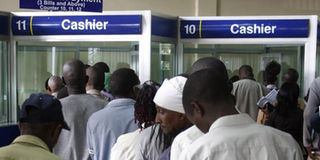Consumers to pay Sh1bn in forex related power bills

Electricity consumers queue to pay their bills at the Kenya Power offices. FILE PHOTO | NMG
What you need to know:
- ERC doubled the forex surcharge to Sh2.35 per kilowatt hour (kWh) of electricity consumed in August, up from Sh1.05 per unit a month earlier.
- This translates to a Sh1.1 billion cost burden on electricity consumers, based on total average monthly consumption of about 830 million units.
- The charge compensates electricity distributor Kenya Power and producers like KenGen for foreign currency costs, including hard currency-denominated loans they have in their books.
The forex component of electricity bills has risen to a six-year high, setting consumers up for an additional Sh1.1 billion cost burden a month.
The increment arises from the Energy Regulatory Commission (ERC) more than doubling the forex surcharge to Sh2.35 per kilowatt hour (kWh) of electricity consumed in August, up from Sh1.05 per unit a month earlier.
The additional Sh1.30 per unit translates to a Sh1.1 billion cost burden on electricity consumers, based on total average monthly consumption of about 830 million units.
The ERC adjusts the levy every month to reflect the prevailing forex rate.
The charge compensates electricity distributor Kenya Power #ticker:KPLC and producers like KenGen #ticker:KEGN for foreign currency costs, including hard currency-denominated loans they have in their books.
The levy had stayed at Sh1 per unit and below throughout last year and touched a low of 75 cents in January this year before rising to Sh2.35 this month as the shilling weakened against the US dollar.
The shilling has shed 1.3 percentage points to the dollar since the year started.
The shilling opened the year at Sh102.56 to the dollar and was by close of business on Monday trading at Sh103.86, according to the Central Bank of Kenya.
Electricity prices have a direct bearing on inflation, being one of the items in the basket of goods and services whose pricing is tracked to measure the cost of living.
At Sh2.35 per unit, the forex levy is the highest since November 2011. Consumer power bills also come loaded with a fuel levy, which like forex surcharge, is adjusted every month.
The fuel levy, which is linked to the amount of power produced by diesel generators and injected into the national grid, has remained unchanged at Sh2.85 per unit since February this year.
Consumers also pay an inflation charge, adjusted twice a year, which hit an all-time high of Sh0.39 per unit last month, further burdening electricity users.




